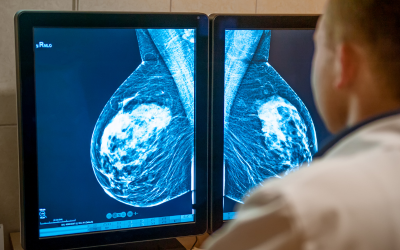Mammogram Results: What is Breast Density and Why Should You Care?
Mammograms continue to be the best tool for breast cancer screening and detection. But not everyone knows what it means or how to respond when their mammogram shows they have dense breast tissue. We spoke to radiologist Steven Scallon, MD, to learn more about why breast density matters, who is more likely to have it and what steps women can take to protect their health.

What is breast density?
All women have three types of tissue in their breasts: glandular tissue, fibrous tissue and fatty tissue. If a woman has more glandular and fibrous tissue on her mammogram compared with fatty tissue, then she is considered to have dense breasts.
Why is breast density important?
Detecting cancer in dense breast tissue on a mammogram can be more difficult. Dense breast tissue shows up as white (radiopaque) on a mammogram. Since both dense breast tissue and cancer appear white on a mammogram, dense breast tissue can potentially obscure an underlying breast cancer. This is called the “masking effect.”
Having dense breasts is also a risk factor for developing breast cancer. About half of U.S. women over 40 have dense breast tissue. Additional screening tests are often needed to get a better picture of what is going on inside a dense breast.
Who is more likely to have dense breast tissue?
According to the Centers for Disease Control and Prevention (CDC), the density of your breasts can change over time but generally, you’re more likely to have dense breasts if you:
- Are younger.
- Are pregnant or breastfeeding.
- Are taking hormone replacement therapy.
- Have a lower body weight.
Will I be notified if my mammogram determines I have dense breast tissue?
On March 9, 2023, the U.S. Food and Drug Administration announced that mammogram providers must notify women if they have dense breast tissue and recommend additional screenings as needed, no later than Sept. 10, 2024. In the state of Washington, this has been a mandate since Jan. 1, 2019. If you are a patient at Overlake, our radiologists notify patients about their breast density via MyChart or by letter.
What can women with dense breast tissue do to protect themselves?
Overlake Breast Health is proud to offer advanced imaging options to accurately respond to the challenge of imaging dense breast tissue. Women with dense breast tissue may consider annual supplementary screening with ultrasound imaging or breast magnetic resonance imaging (MRI). These screenings can pick up additional breast cancers that are not detected mammographically. If you have concerns about your personal risk factors, contact your primary care provider to discuss further.
For more information on breast density, visit the resources below:
Over a lifetime, about one in eight women will get breast cancer, according to the CDC. Mammograms continue to be the best tool for breast cancer screening and detection. Overlake Breast Health is proud to offer the most advanced imaging options to accurately respond to the challenge of imaging dense breast tissue. To schedule your mammogram, call (425) 688-5985 today.









